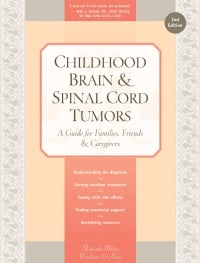When your child is discharged from the hospital after surgery, you are given written instructions about home care that should include instructions for care of the incision or directions about dressing changes. The most important thing to remember when caring for the operation site is to wash your hands thoroughly with soap and water before changing dressings. Most neurosurgeons recommend cleaning incisions with regular showers, including shampooing, beginning as soon as 3 days after surgery.
You may also need to ensure that your child does daily physical therapy exercises. Before discharge, the physical therapist will discuss this with you and give you written directions for helping your child do the exercises properly. Sometimes a physical therapist comes to your home, or you will take your child to physical therapy appointments several times a week.
We had some physical therapy as soon as he could tolerate it in the hospital, but the doctor didn’t feel he needed it at home. Our child was under 3 and eligible for early intervention services (which is available to all children younger than school age who have the potential for delayed development) because of his diagnosis, so we asked for and received some physical therapy from them for a period of time.

Our neurosurgeon told me not to worry about Michael playing soccer (he scored a goal in his first game back—a diving head ball!), that his metal plate was screwed in with titanium screws and wasn’t about to move.
At discharge, you will receive a follow-up appointment with your child’s surgeon to have any staples or stitches removed. Your surgeon should let you know the next step in the treatment process and which member of the multidisciplinary team is in charge of that phase of treatment.

Chris was born with a condition called gelastic epilepsy, caused by a hypothalamic hamartoma, a rare congenital tumor which can cause intractable seizures, behavior rages, early puberty, and cognitive decline. Surgery to remove this tumor has had to be the most emotional and most difficult experience of my life. Everything was running through my head, both negative and positive thoughts. Of course, there was the overwhelming fear that something might go wrong. I had experienced this in the weeks leading up to surgery, and had tried to prepare myself more for this time, but the intense feelings were so strong, it is hard to explain. I kept telling myself that we had to go through with it because this was his real chance.
I left Chris asleep in the anesthetic room. I came out in tears and continued to battle with my emotions. Our neurosurgeon came to see us and assured us that things would be all right. He was going to take good care of him. I felt a deep inner sense of comfort about this man, that he truly did love and care for all the children he operated on. This helped a lot and we began to settle down a little. The neurosurgeon’s associate came up to the ward a few hours later to tell us that he had got the tumor out. We then went down to the parent recovery waiting room and our neurosurgeon came out to talk with us and tell us more about the surgery in detail—the beaming smile on his face said it all.
It was like a dream, there we were, sitting and being told that this terrible thing was no longer inside our son’s head. All of a sudden there was this tremendous weight taken off my shoulders and I felt a strange sense of peace within.
Chris slept more or less the whole night and most of the following day. We watched over him as he was constantly checked for responsiveness, blood pressure, signs of seizure, and fluid input and output. That evening he developed a high temperature, we were told to expect this might happen, and it settled down.
Next morning at around 4 a.m., Chris woke up and asked, “Dad, can I have some cola?” You cannot imagine how I felt: I had my son back, he was going to be okay.
Table of Contents
All Guides- Introduction
- 1. Diagnosis
- 2. The Brain and Spinal Cord
- 3. Types of Tumors
- 4. Telling Your Child and Others
- 5. Choosing a Treatment
- 6. Coping with Procedures
- 7. Forming a Partnership with the Treatment Team
- 8. Hospitalization
- 9. Venous Catheters
- 10. Surgery
- 11. Chemotherapy
- 12. Common Side Effects of Chemotherapy
- 13. Radiation Therapy
- 14. Peripheral Blood Stem Cell Transplantation
- 15. Siblings
- 16. Family and Friends
- 17. Communication and Behavior
- 18. School
- 19. Sources of Support
- 20. Nutrition
- 21. Medical and Financial Record-keeping
- 22. End of Treatment and Beyond
- 23. Recurrence
- 24. Death and Bereavement
- 25. Looking Forward
- Appendix A. Blood Tests and What They Mean
- Appendix C. Books and Websites

